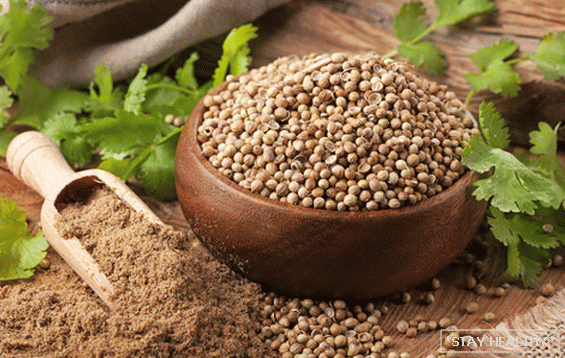 Ср, 16 май 2018 Автор: Анна Кедрова
Ср, 16 май 2018 Автор: Анна Кедрова
Coriander and cilantro are one and the same plant, but different
parts of it, each with its own virtues
taste and aromatic qualities and beneficial properties. Thanks to this
spices, food will sparkle with new colors, and health – not
slow to improve.
Contents
What can be said in general terms about the benefits of coriander and its
value in the kitchen
Herbaceous annual plant coriander (vegetable coriander)
over two and a half millennia highly valued as universal
Spice and medicinal plant, the Ancient Kitchen flourished with it
Rome, and on the land of Russia, he came almost simultaneously with the cabbage.
Coriander is called not only the plant entirely
scientifically, but also its small round seeds ripening on
umbrellas, very reminiscent of those that have dill (they are with coriander
belong to the same umbrella family).
Coriander seeds are consumed only in dried form, whole or
ground, they combine the bitterness, sweetness and bright aroma, they
need in marinade to vegetable preparations, dishes from potatoes and meat,
some cheeses and sausages, and another bright example – by them
often sprinkle the tip of Borodino bread.
Green plants are called cilantro. Leaflets that look like
parsley, consumed fresh and dried, for salads, sauces,
first and second courses, appetizers and casseroles.
Cilantro is popular in Greek, Sicilian, Turkish, Georgian and
Chinese cuisines.
The root of the plant, with a taste more muffled than
greens and kernels, less popular, but also used,
for example, in the kitchens of Southeast Asia.
Nutritionists recommend eating no more than 35-40 g of greens per day
and 4 g of coriander seeds.
Despite the fact that the chemical composition of coriander seeds and verdure in
principle can not be identical, both of these edible parts of the plant
have a common set of positive properties, allowing, between
By the way, feel freer when choosing what
tasty and healthy cooked with coriander.
In the plant, from the top of the umbrellas to the roots are contained
phytoncides, amino acids, tannins, carbohydrates, starch,
antioxidants, pectin, organic acids, magnesium, iron,
sodium, phosphorus, potassium, almost all B vitamins, as well as D, C, E
and K.
If we consider the properties of coriander, the most complete
covering the human body then we can say that he
promotes:
• normalization of metabolism;
• increase immunity;
• increase endurance to physical exertion;
• improvement of health in general (invigorating, tonic effect
cilantro);
• stabilization of the hormonal background of women (in particular, due to
stimulating the production of the female hormone estrogen).
When will coriander benefit?
The most pronounced effect of coriander on the digestive
spice system:
• whets the appetite (so much that a diet for weight loss can
be in jeopardy);
• improves the absorption of fatty heavy foods (eg, meat,
freshly baked pies, rich soups, fried potatoes);
• stimulates the production of gastric juice and normalizes it
acidity (provided that it is lowered);
• reduces inflammation and heals minor
damage to the mucous membranes of the digestive tract;
• normalizes intestinal motility;
• increases the absorption of vitamins, minerals and other beneficial
substances from all incoming food.
Coriander is also a rare source of natural antibiotic.
dodecenal effective against many infectious diseases
digestive system capable of destroying even pathogens
salmonellosis.
With a cold, coriander helps to get rid of the heat (acts as
diaphoretic) and feverish condition if the disease has passed on
respiratory organs – it can be used to reduce the flow in them
inflammatory processes and suppress dry cough.
Coriander is useful for low blood clotting, since
increases it and thereby reduces the risk of bleeding representing
serious danger from injuries or certain medical
interference.
Being a diuretic, coriander improves kidney function, as
pain reliever and again as anti-inflammatory – can
relieve symptoms such as cystitis.
In addition, the removal of excess fluid reduces swelling and accelerates
cleaning the body of toxic substances (coriander belongs to those
rare plants that ways to deal with the effects of particular types
poisoning – alcohol, heavy metals, mushrooms).
Also, regular use of coriander,
promotes:
• reducing pain in rheumatic diseases;
• cleansing the liver;
• lower blood sugar and cholesterol levels.
How else does coriander benefit?
Fresh green cilantro perfectly heals the mouth –
strengthens the gums and reduces their bleeding, prevents
development of periodontal disease and caries, reduces bad breath,
freshens breath.
Coriander can be recommended for improvement. psychoemotional
conditions with increased stress loads, prevention
depressive states and increased mental abilities.
Regarding the effect on vision, the plant:
• reduces eye fatigue with daily exertion (for example,
work at the computer);
• reduces symptoms of conjunctivitis;
• reduces the risk of developing cataracts and glaucoma.
What can be harm from coriander
Increased vitamin C makes coriander (especially
greens) not a useful product for diseases of the gastrointestinal tract,
accompanied by increased acidity of the stomach.
Also, in order to avoid harm from coriander, with care
it is used under the following circumstances:
• violations of the functioning of the pancreas;
• renal failure;
• cardiac diseases (and especially – with
lack of blood supply to the heart muscle).
Minted cilantro and coriander and just as seasoning
can not, in theory, harm pregnant women, but in the period
baby’s expectations and breastfeeding, mothers are strictly contraindicated
be treated with means (infusions, decoctions) of traditional medicine from this
plants to avoid at least metabolic disorders and
endowing the child with a tendency to allergies.
The ability to thicken blood gives coriander harm to people
prone to thrombosis, with aneurysm (pathological
expansion of the blood vessels, increased fragility of the vessels and
capillaries.
For the same reason, you should not combine spice and anticoagulants.
(blood thinners) – their properties will enter
confrontation and at best, treatment will be ineffective.
It is also advisable to limit the use of coriander in the period
antibiotic treatment – the active components of the plant, entering into
reaction with the composition of drugs, increase the risk of developing antibiotics
allergic reactions.
Systematic overdose of spices has its consequences in
the form of over-stimulation of the nervous system, insomnia and deterioration
short term memory.






